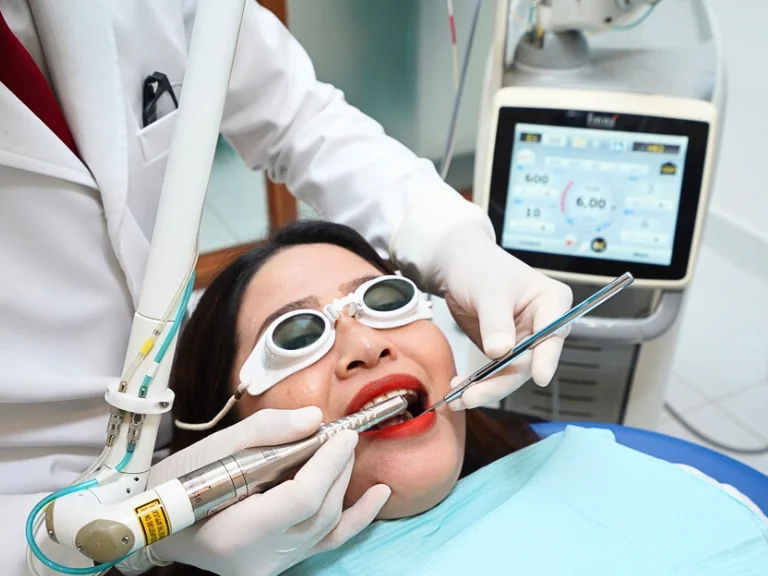A dazzling smile isn’t just a facial highlight; it’s a mirror reflecting your overall health. Yet, many people still overlook a seemingly simple but incredibly crucial habit: routine dental check-ups. So, are regular dental check-ups important? The answer is YES, and they’re far more vital than you might imagine! This article will delve into the immense benefits of frequent visits to the dentist, helping you understand why this is the smartest investment you can make for your smile and your health.
1. What Are Routine Dental Check-ups and Why Are They So Important?
A routine dental check-up involves visiting the dental clinic for an examination of your oral health according to a set schedule, typically every 6 months or as advised by your dentist. A routine check-up usually includes:
- Comprehensive Examination: The dentist will inspect your entire oral cavity, from teeth, gums, and tongue to the palate, to detect any early signs of abnormalities.
- Dental Scaling (Cleaning): This is an essential step to remove plaque and tartar buildup, the leading causes of tooth decay and gum inflammation.
- Teeth Polishing: Helps remove stains from the tooth surface, resulting in a brighter smile.
- Consultation and Guidance: The dentist will provide advice on effective at-home oral care, dietary recommendations, and answer any questions you may have.
So, why is it so important? Oral health extends beyond having bright white teeth. It’s intimately connected to your overall health. Many serious systemic conditions, from heart disease and diabetes to stroke, can originate from or be influenced by chronic oral problems. Routine dental check-ups serve as a “shield” to help you detect and prevent these risks early on.

2. Outstanding Benefits of Routine Dental Check-ups
Early Detection and Prevention of Oral Diseases
This is the most crucial benefit of routine dental check-ups. Many oral diseases, such as tooth decay, gingivitis, and periodontitis, often show no clear symptoms in their early stages. By the time you feel pain or discomfort, the condition has become severe, and treatment will be much more complex and costly.
- Tooth Decay: The dentist can detect tiny cavities that haven’t yet caused pain and perform timely fillings, preventing the spread of decay.
- Gingivitis (Gum Inflammation): Plaque and tartar buildup are the primary causes of gingivitis. Routine scaling helps remove them, stopping gum bleeding and swelling.
- Periodontitis: If gingivitis is left untreated, it can progress to periodontitis, destroying the jawbone and leading to tooth loss. Regular check-ups help control and treat it promptly.
- Chronic Bad Breath: Often caused by bacterial buildup or underlying oral diseases. The dentist can identify the cause and provide effective solutions.
Protecting Permanent Teeth, Reducing the Risk of Tooth Loss
Permanent teeth are a precious asset we only get once in a lifetime. Tooth loss not only affects your ability to chew and your appearance but also leads to problems like jawbone loss and shifting of remaining teeth. Routine dental check-ups and early treatment of issues like decay and periodontitis are the most effective ways to ensure your natural teeth last a lifetime.
Long-term Cost Savings on Treatment
Many people think routine dental check-ups are expensive. However, the reality is quite the opposite! The cost of a routine dental check-up and scaling is minimal compared to the expenses incurred for treating severe conditions such as:
- Root Canal Treatment: Much more costly and time-consuming than a simple filling.
- Tooth Extraction and Dental Implants: Costs can run into thousands of dollars for a single tooth.
- Dental Crowns: Necessary when teeth are severely damaged.
A small annual investment in routine check-ups will help you avoid much larger expenses in the future.
Early Detection of Other Serious Conditions (Especially Oral Cancer)
Dentists don’t just check your teeth and gums. They can also detect abnormal signs on your lips, tongue, palate, and inner cheeks – areas where precancerous lesions or early-stage oral cancer might appear. Early detection of oral cancer is a key factor in increasing treatment success rates.
Guidance on Proper Oral Care
Not everyone knows how to brush, floss, or use mouthwash correctly. During each routine check-up, your dentist will provide personalized advice, guiding you on the most effective oral hygiene techniques tailored to your specific dental condition. This optimizes your at-home oral care, enhancing disease prevention.
Fresher Breath and a Confident Smile
Plaque, tartar, and conditions like tooth decay and gum inflammation are the leading causes of bad breath. Routine scaling and treatment of these issues will help you have fresh, clean breath. A healthy, radiant smile will also boost your confidence in communication and daily life.

3. How Often Should You Get a Routine Dental Check-up?
Most dentists recommend routine dental check-ups and scaling every 6 months (twice a year). However, for some special cases, such as:
- Individuals with a history of periodontal disease.
- Those with diabetes or heart conditions (which can affect oral health).
- Pregnant women (hormonal changes can easily cause gingivitis).
- Individuals undergoing orthodontics or who have many dental restorations like crowns or implants.
Smokers.
These cases may require more frequent visits, as specifically advised by their dentist.
4. Are Routine Dental Check-ups Painful?
This is a common concern for many, especially children. In reality, modern routine dental check-up and scaling procedures are performed very gently, quickly, and with minimal discomfort.
- Ultrasonic Scaling: Modern equipment effectively removes tartar with little to no sensitivity. You might feel a slight tingling or ticklish sensation on your gums, but it’s entirely within a tolerable range.
- Professional Dentists: With high skill and experience, dentists perform procedures as gently as possible.
If you have a low pain threshold or are overly anxious, discuss it with your dentist for advice on pain relief support methods (like topical anesthetics) if needed.
5. Tips for Effective Routine Dental Check-ups
To ensure your routine dental check-ups are maximally effective, you should:
- Choose a Reputable Dental Clinic: Look for clinics with a highly skilled team of dentists, modern equipment, and strict adherence to sterilization protocols.
- Inform Them of Your Medical History: Provide your dentist with complete information about any systemic diseases (if any), medications you are taking, or any issues you are experiencing with your teeth and mouth.
- Adhere to Your Appointments: Don’t miss your routine check-ups. Consistency is key to maintaining optimal oral health.
- Practice Proper At-Home Oral Care: Routine check-ups are only one part. Brushing twice a day, using dental floss, mouthwash, and maintaining a healthy diet are crucial daily factors.



